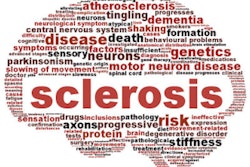PET imaging could help detect neuroinflammation caused by multiple sclerosis (MS), according to research presented at the Society of Nuclear Medicine and Molecular Imaging (SNMMI) annual meeting in San Diego.
MS is characterized by inflammation and the destruction of neuronal fibers, specifically myelin, in the nervous system. Research suggests that a process called sphingolipid signaling is a primary mechanism in inflammatory disease processes, and that the sphingosine-1-phosphate receptor 1 (S1P1) is an effective biomarker for imaging, according to the SNMMI. In fact, in 2010, the U.S. Food and Drug Administration (FDA) cleared a drug called fingolimod that works by "turning down" the autoimmune response via S1P1.
Adam Rosenberg, PhD, of Washington University School of Medicine in St. Louis and colleagues created a library of S1P1-targeted small molecules and radiolabeled them with F-18. They then conducted a preclinical PET study that imaged S1P1 in rodents with inflammatory disease as well as healthy controls.
PET revealed an increase in S1P1 expression in animals with an inflammatory response, compared with the healthy controls, leading Rosenberg's group to conclude that PET is a promising modality for imaging the progression of multiple sclerosis and other inflammatory diseases.



















